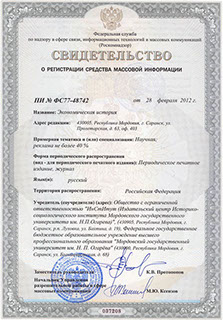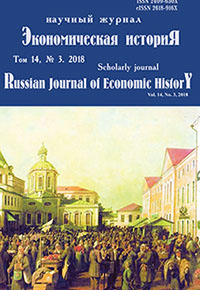Экономическая историЯ
Russian Journal of Economic History
ISSN 2409-630X (Print)
ISSN 2618-916X (Online)
Expert board:
- Scientific Council of RAS on economic history;
- Research and Educational Center «The economic history of Central Russia and the Middle Volga region» of Ogarev Mordovia State University;
- Center of Economic History of Lomonosov Moscow State University
Navigation
Certificate of registration

ISSN 2409-630X (Print), ISSN 2618-916X (Online)
DOI: 10.15507/2409-630X.042.014.201803.326-335
УДК 336
Vyacheslav Y. Baybikov
Money and Credit Journal (Bank of Russia) (Moscow, Russia),
e-mail: Slava.viach@mail.ru
ORCID https://orcid.org/0000-0002-4501-7581.
THE FISCAL AND ECONOMIC POLICY OF THE RUSSIAN MINISTER OF FINANCE S. Y. VITTE AND CRITICISM OF IT FROM S. F. SHARAPOV (XIX – BEGINNING OF XX CENTURY)
Introduction. In 1842 Russian Finance Ministry was leaded by S. Y. Vitte. On his initiative serious economic reforms were carried out: the implementation of monetary reform, the construction of Siberian railway line and the adoption of the new statutes of the State Bank. However, the fiscal and monetary policy of S. Y. Vitte had its supporters as well as its opponents. Among those who were against the measures taken by S. Y. Vitte a well known (in those days) economist and publicist S. F. Sharapov, who especially defended the rights of the peasantry and argued that the development of Russian economy was different from the way of Eastern Europe. Materias and Methods. Despite many publications on this topic there has not been yet full research on the reorganizations undertaken by S. Y. Vitte and the alternative models put forward by his opponents and which specific direction of the fiscal and monetary policy were criticized. The aim of the given article is the analysis of the major reforms made by S. Y. Vitte, the critique on the part of his adversaries and familiarizing with the alternative suggestions. One can best understand it on the economic activity of S. F. Sharapov, who was the main opponent of most of the reorganizations. Results and Discussion. Among the main directions of the policy carried out by Finance Ministry in 1892–1903 one can single out the following: the preparation and implementation of monetary reform, which became the cornerstone of Vitte economic policy and the construction of railroads. Monetary reform was conducted gradually during 1895–1897. At the moment of its preparation S. F. Sharapov severely criticized the fiscal policy carried out by S. Y. Vitte. Unlike the supporters of the metal money circulation, he considered that the basis of the monetary system of Russia must be a paper rouble, which was pegged neither to gold nor to silver. S. F. Sharapov also came out against the wide range of the construction of railroads. In spite of the popularity of his ideas in the Russian society S. F. Sharapov did not get the support of the representatives of the main socio-political tendencies. There turned out to be more supporters of monetary reform and economic reorganizations. Conclusion. As for the monetary reform – the most important event in the activity of S. Y. Vitte – there is still a difference of opinion who was right: the supporters of introducing gold standard in Russia or its opponents “the nominalists” remains an open question. In 1898 summing up the results of the economic reform S. Y. Vitte ascertained that “money supply in Russia has been put to order and has been performing as soundly as in those states, where this branch of economy has long been in perfect order”. Subsequent events confirmed that “the nominalists” might have been right. Nowadays world monetary systems do not foresee the exchange of monetary units for gold and currencies are not pegged at the exchange rate of gold. The era of gold standard has come to an end and at present exchange rates and the stability of a monetary unit of this or that country depend on the state of the economy of this country. As far as railroad construction is concerned it should justly be noted, that a great deal of railroads as well as the construction of factories and plants in the whole world has caused damage to the environment as was foretold by S. F. Sharapov. Yet, when the territory of Russia was covered by rail network it resulted in a transfer of economic and cultural centres – cities through which railroads were laid began to develop rapidly and the cities without railroad connection started falling into decay. Thus Russia changed greatly.
Keywords: gold standard, paper money, economy, railways, fiscal and monetary policy.
For citation: Vyacheslav Y. Baybikov. The Fiscal and Economic Policy of the Russian Minister of Finance S. Y. Vitte and Criticism of it from S. F. Sharapov (XIX – beginning of XX century). Ekonomicheskaya istoriya = Russian Journal of Economic History. 2018; 14(3): 326–335. (In Russ.). DOI: 10.15507/2409-630X.042.014.201803.326-335
© Ogarev Mordovia State University. History and Sociology Institute, 2017
68, Of. 411, Bolshevistskaya St., 430005, The editorial office of the scholarly journal «Russian Journal of Economic History»
Tel.: (8342) 24-25-90; 27-07-11, Fax: (8342) 24-25-90, E-mail: jurnal-econom-hist@isi.mrsu.ru
Designed by A. Napalkov, Email: napalkov@isi.mrsu.ru

